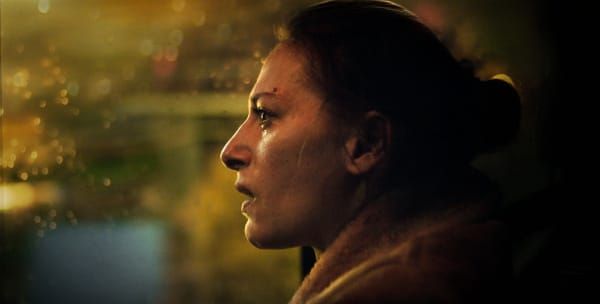Eye For Film >> Movies >> Blind Spot (2018) Film Review
Blind Spot
Reviewed by: Amber Wilkinson

It's almost impossible to talk about Blind Spot in any critical detail without more or less 'spoiling' an event that occurs at around the 20-minute mark - so if you want to keep your own bind spot going in, I recommend you stop reading now.
If you do read nothing about actress Tuva Novotny's directorial debut - as I did - then its moment of tragedy and crisis will come as a shock. This is not least because so little of consequence has happened in the minutes leading up to it, as we have watched Tea (Nora Mathea Øien) finish up a handball match and then walk home with her friend in real time. Up until the moment when the girls say goodbye to one another, in fact, the film could have focused on either of them. What happens to Tea is unexpected but although handled well in terms of blindsiding the audience and giving us a taste of what her stepmother Maria (Pia Tjelta) feels, it is never fully vindicated by what comes after.
What does follow is a lot in terms of emotion, but much less in terms of content, and we feel every second of it due to the director's decision to make this a single-take film. This technique can be exhilarating, as Sebastian Schipper's Victoria was but here it just reminds you why most directors embrace the editing room. There's no doubting the technical skill of cinematographer Jonas Alarik, ducking back and forth to follow Maria in an ambulance or weave with characters between hospital room. But neither this, nor Tjelta's incredibly intense performance, which rides from hitching hysterics to numb shock and every tear-stained station in between can cover up the film's lack of narrative substance. It is perhaps inevitable that, as a actor herself, Novotny would want to showcase Tjelta's performance - which has already won an award at San Sebastian - but because we are given so few facts to work with regarding the situation of the family the 10-minute or so journey between home and hospital and back again becomes more of a viewing chore than an act of tension.
The hospital, where much of the action occurs, also has shades of the uncanny valley about it. Somehow Maria and her father-in-law seem to be the only people in an accident and emergency corridor and, while I except the Norwegian healthcare system may well be world class, it seems highly unlikely a saint-like nurse (Oddgeir Thune) would be able to stay with Maria and her newly arrived husband Anders (Anders Baasmo Christiansen, whose acting is on the broad side compared to everyone else), easing them through every single moment, gently soothing them while ensuring story exposition.
Details of Tea's history are fed into the late stages of the film but it never feels like much more than lip service to mental health wrapped in cod-psychological analysis while the focus remains on Maria. The veneer of technical excellence never quite takes your mind off the lack of substance beneath.
Reviewed on: 06 Oct 2018















